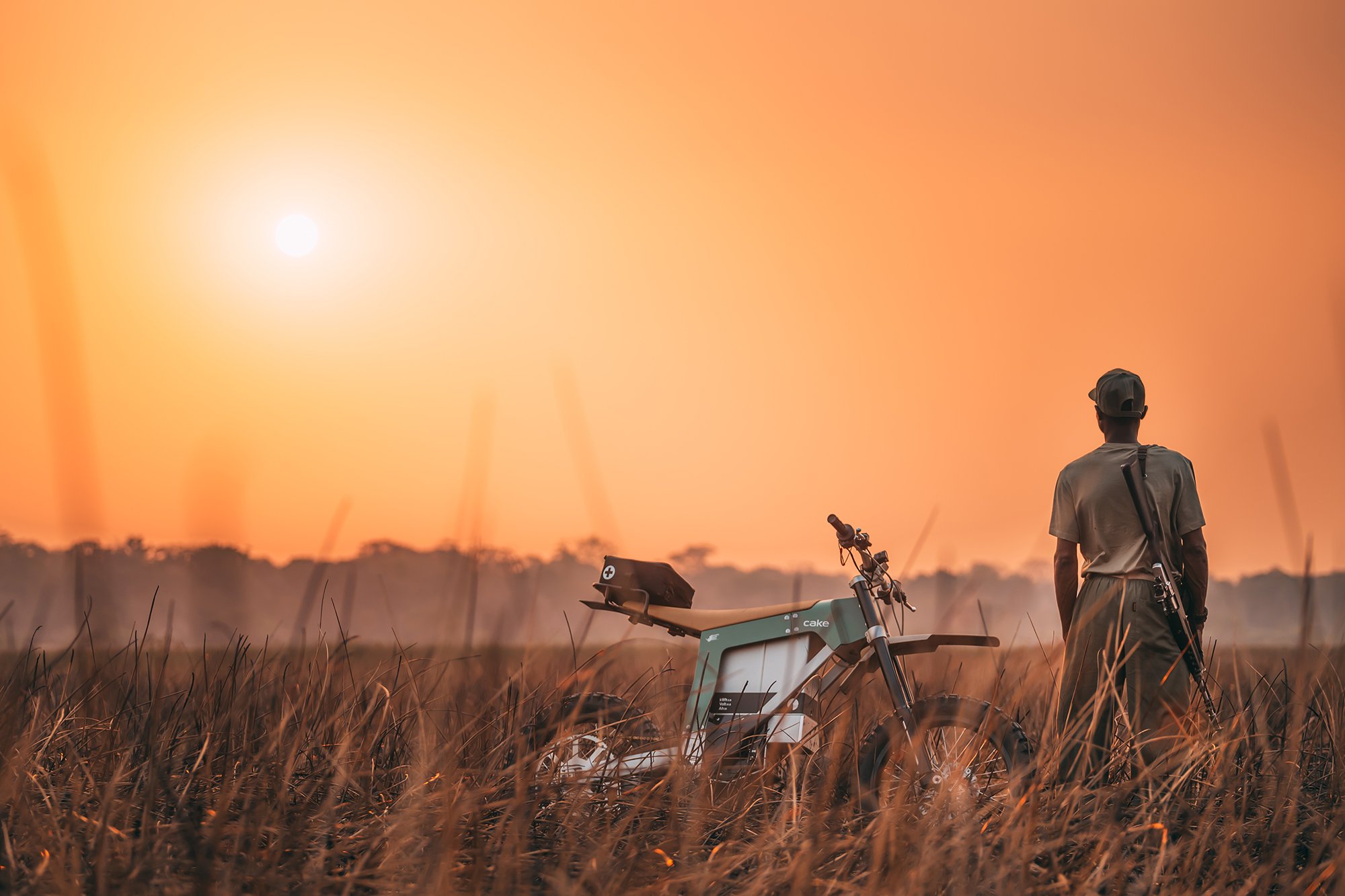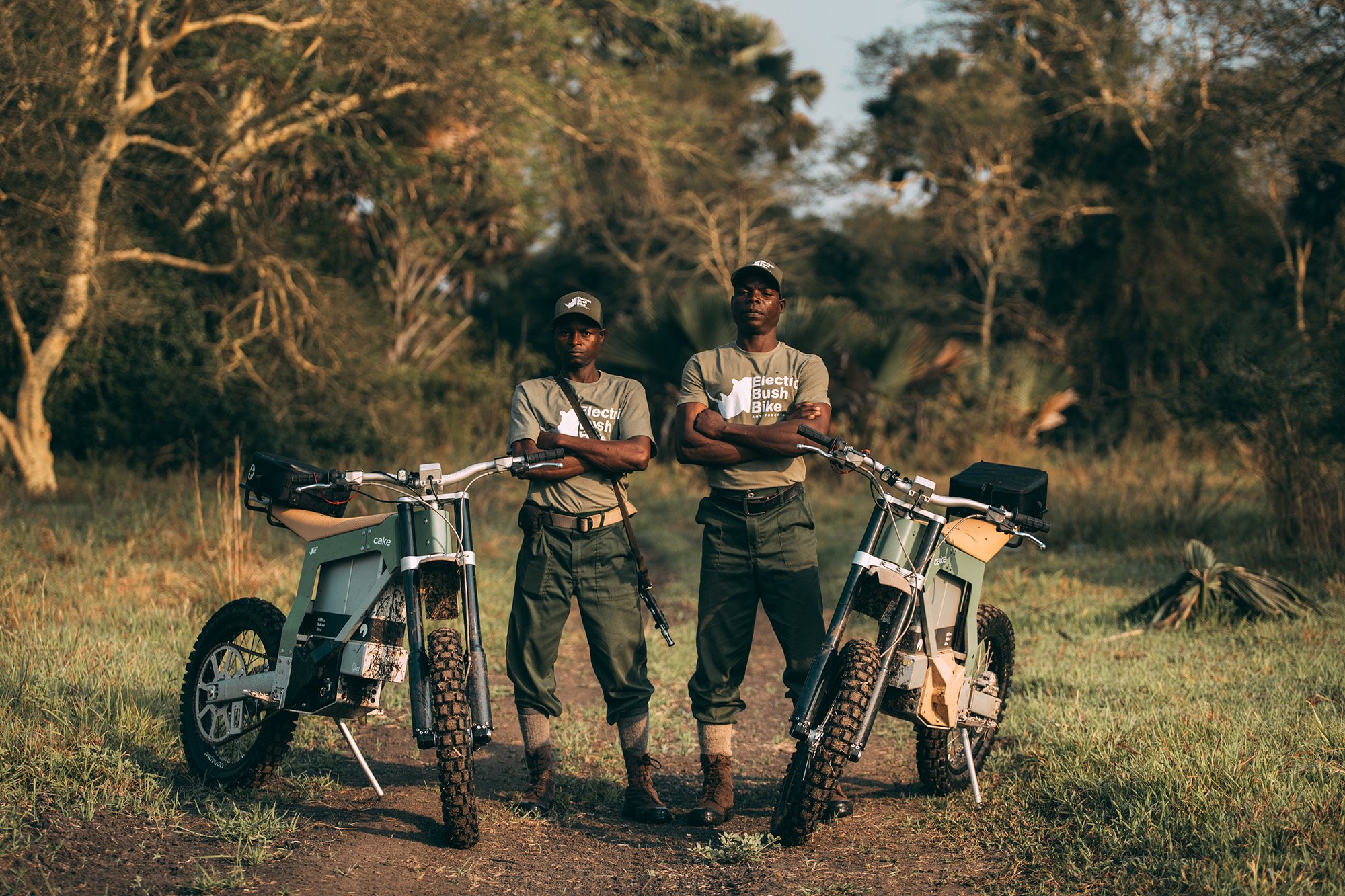CAKE's electric anti-poaching motorbikes
Poaching, or the illegal killing and trading of wild species’ parts for money, has sadly been around for many years – since the Middle Ages as it turns out – and continues to do much damage to our world’s wildlife and biodiversity on the African continent. For instance, as many as 100 elephants are poached every day, and if current rates continue some elephant populations could be extinct in the wild by 2025. Many reserves and national parks have been actively fighting this illegal trade for decades, some with success, but it remains a challenge to properly train and equip rangers to fight off poachers.
Poaching is a key threat to many species of wildlife all over the world, from large well-known animals such as elephants, rhinos and tigers, to mysterious and little-known species like pangolins – who are poached for their scales and meat.
Various initiatives have been launched to find innovative and more efficient ways to find poaching. For example, in 2015 the South African Wildlife College established its first K9 unit, with the support of the WWF Ned Bank Green Trust. This has been a game changer for the organisation – but many poachers still manage to get their way.
Poaching & mobility
The mobility industry is no neutral player in regards to the poaching problem, and most definitely has a role to play. The illegal wildlife trade is valued between $50-150 billion USD a year, and is among the five most lucrative global crimes. Like any other industry, poaching runs on supply and demand – and deplorably, the demand is global. This of course implies that poached animal parts make it onto planes, boats, and trains to their receiving country – which is where the Transport Taskforce comes in.
In 2014, The Duke of Cambridge announced the formation of the Transport Taskforce, with the goal of enlisting the transport sector to identify and develop relevant solutions to wildlife trafficking. The Taskforce brought together transport stakeholders including airports, shipping companies and airlines with law enforcement and other agencies to identify and facilitate action led by the private sector.
The result was the development of the Buckingham Palace Declaration, 11 principles meant to guide a response to the crisis represented by illegal wildlife trade. Now signed by over 100 transport sector companies from across the globe, the Taskforce is taking steps every day to help stop the trafficking of wildlife products.
CAKE’s anti-poaching bikes
Though this is surely a great help, another way in which mobility plays a central role in fighting poaching is through the use of motorbikes. Motorbikes remain the fastest and most agile way to navigate the wild – and therefore are the preferred vehicles for stopping poachers. That being said, these many motorcycles require large amounts of fuel, and because it is a scarce resource in these regions, it often has to be transported in highly-pollutive and time-consuming ways.
According to CAKE, providing ten rangers with gasoline equates to 22,000 litres annually when brought by truck, a number potentially doubled when transported by helicopter – this of course is not sustainable, and doesn’t make much sense when employed in a fight to preserve wildlife.
Another downside of these motorbikes is the noise – poachers can usually hear rangers coming from afar simply from the sound of their combustion engines, which of course hurts their efforts to arrest poachers.
This is where CAKE comes in. The Swedish electric motorcycle company founded in 2016 by entrepreneur Steffan Ytteborn has since made waves in electric mobility with its innovative projects and stylish designs – it is the full package. At CAKE, one of the driving goals is to create a zero-emissions society, so it goes without saying that sustainability is a large aspect of their design processes.
In 2021, CAKE launched the first-ever electric anti-poaching bike with its Kalk AP, designed and optimised for the harsh conditions of the South African bush and in collaboration with the South African Wildlife College (SAWC) to help rangers increase their success rates with combatting poachers.
The bikes were designed for off-road driving, and equipped with solar technology and completely silent, which is of course a huge help for a more efficient use. The bikes were distributed to the SAWC and trialled, with huge success.


“Solar power, new technology, and a new category of vehicles that help save endangered species in Africa. This is a perfect example of purpose meeting sustainability. We are extremely honoured to be able to work with our partners on this initiative and to contribute to developing the means to help curb poaching in the region.” – Stefan Ytterborn, founder and CEO of CAKE
This year, the brand launched the Ösa AP (anti-poaching) bike, which was revealed in Denver last January, an upgraded version of the Kalk AP. This time, CAKE went even further with their optimisation: the Ösa AP uses sealed motors and drivetrains to protect against dust as well as new cooling solutions. The bike is also fitted with wider wheels and tyres.
Most impressively, CAKE also developed software to enable a quick switch between prioritising range and speed, depending on whether the rangers are patrolling the bush or chasing down poachers. Another feature is the extra communication kit created to help riders contact the ranger camp while out on patrol.
There are countless initiatives and efforts to promote electric mobility and urban mobility, which will no doubt result in a more sustainable industry and hopefully a healthier planet – but there are few electric mobility companies getting involved in issues such as poaching.
This is what makes this project stand out, and why we at ellectric are delighted to feature it on our magazine. We’re excited to see the ways in which companies within the industry will put themselves at the service of issues and regions outside of the West for the sake of our future. Check out our previous article on CAKE here.
Pictures: CAKE


